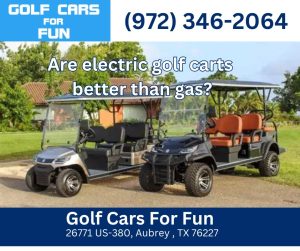Understanding the Basics: Electric vs. Gas Golf Carts
How Electric Golf Carts Work
Electric golf carts operate on rechargeable batteries that power an electric motor. Most models use lead-acid or lithium-ion batteries, which deliver smooth, quiet performance. They require regular charging, typically overnight, and are known for their simple, low-maintenance operation. Electric carts are popular for both golf courses and residential communities due to their quiet nature and emission-free use.
How Gas Golf Carts Work
Gas golf carts run on combustion engines, similar to small cars or lawn equipment. These engines are fueled by gasoline, offering extended range and reliable performance, especially for heavy-duty tasks. While they require regular maintenance, such as oil changes and fuel refills, gas carts are often preferred in rugged environments or for longer usage periods without access to charging stations.
Performance Comparison: Power, Speed, and Range
Power and Torque Differences
Electric carts offer instant torque, providing smooth acceleration and steady climbing ability on hills. However, gas carts often deliver higher horsepower, making them suitable for hauling heavy loads or navigating challenging terrains. If you need a cart for off-road tasks or towing, a gas-powered model may be the better option.
Speed Capabilities on Course and Off
Both electric and gas golf carts typically offer similar top speeds, usually around 12-20 mph depending on the model. However, electric carts may have a slight edge in acceleration due to their instant torque. For most recreational uses, both types perform adequately in terms of speed.
Range and Refueling/Charging Time
Gas carts can run for extended periods on a single tank, often lasting an entire day of use. Refueling takes just a few minutes. In contrast, electric carts typically offer a range of 15-40 miles per full charge and require several hours to recharge. For all-day events or extended property use, gas may be more convenient. However, for short-term, quiet use, electric carts remain a solid choice.
Maintenance and Longevity
Maintenance Needs of Electric Golf Carts
Electric carts require minimal maintenance—mainly battery care and periodic checks of electrical components. Battery lifespan varies but generally lasts several years with proper upkeep. They have fewer moving parts compared to gas carts, which reduces long-term maintenance demands.
Maintenance Needs of Gas Golf Carts
Gas carts need regular engine maintenance, including oil changes, filter replacements, and fuel system upkeep. Though durable, they demand more attention to keep running smoothly. This can be a deciding factor for renters or owners who prefer low-maintenance equipment.
Battery Life vs. Engine Longevity
Electric golf cart batteries typically last between 4-6 years, depending on use and maintenance. Gas engines can operate reliably for many years with regular care. While both require investment over time, maintenance preferences may guide your choice.
Environmental Impact and Noise Levels
Emissions and Eco-Friendliness
Electric carts are emission-free during operation, making them a more eco-friendly choice for parks, neighborhoods, and recreational areas. Gas carts emit exhaust gases, contributing to environmental concerns, especially in enclosed or natural areas.
Noise Factor: Quiet Ride vs. Engine Sound
One of the key advantages of electric golf carts is their quiet operation, making them ideal for residential settings, golf courses, or quiet events. Gas carts generate engine noise, which can be a drawback in peaceful environments.
Cost of Ownership: Purchase, Maintenance, and Operation
Upfront Cost Comparison
Electric and gas carts have comparable upfront costs, but variations exist based on features, brands, and battery technology. Typically, high-performance batteries may increase the cost of electric models.
Fueling vs. Charging Costs
Electric carts can be more economical over time due to lower electricity costs compared to gasoline. Charging at home or on-site is generally cheaper than refueling with gas. However, electricity availability and charging time are important considerations.
Long-Term Ownership Expenses
Gas carts may incur higher maintenance costs due to engine servicing and fuel expenses. Electric carts, with fewer mechanical components, tend to have lower long-term upkeep. Battery replacement, however, is a notable cost that electric cart owners should plan for.
Which Golf Cart Suits Your Needs?
Ideal Use Cases for Electric Golf Carts
- Residential communities and neighborhood driving
- Golf courses and parks
- Events requiring quiet transport
- Short-term recreational use
- Eco-conscious applications
Ideal Use Cases for Gas Golf Carts
- Outdoor worksites and rugged terrain
- Long-range property management
- All-day events with heavy hauling
- Remote areas without charging access
- Utility purposes in large open spaces
Factors to Consider Before Choosing
- Intended use and frequency
- Noise tolerance and environment
- Access to charging stations or fuel
- Maintenance preferences
- Environmental impact concerns
Comparison Table: Electric vs. Gas Golf Carts
| Feature | Electric Golf Cart | Gas Golf Cart |
|---|---|---|
| Operation Noise | Quiet | Engine Noise |
| Emissions | Zero Emissions | Exhaust Emissions |
| Maintenance Needs | Low (Battery Care) | Higher (Engine Care) |
| Range | 15-40 miles per charge | Extended with refueling |
| Power and Load Capacity | Moderate | Higher for heavy-duty tasks |
Final Thoughts: Which One Comes Out on Top?
Choosing between an electric and gas golf cart depends entirely on your specific needs. Electric carts offer quiet, eco-friendly operation with lower maintenance, making them perfect for casual use, neighborhoods, or events. On the other hand, gas carts provide extended range, higher power, and rugged performance ideal for work applications or long-term outdoor use. By understanding the strengths of each type, you can select the right cart for your lifestyle or rental needs.
Conclusion
Both electric and gas golf carts bring unique advantages, and the better choice depends on how and where you plan to use them. Golf Cars For Fun understands the varying needs of our customers and offers a range of rental options to suit every situation. Whether you need a quiet cart for a community event or a powerful vehicle for outdoor work, we are ready to help. Reach out today or explore more at Golf Cars For Fun to find the perfect fit for your next adventure.



